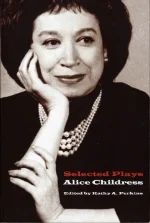Gold Through the Trees (1952)
by Alice Childress
This is a dramatic piece with music made up of vignettes that trace out periods of struggle from the African continent to America and back, from the time of the Middle Passage to the contemporary struggles of South Africa. It is poignant, passionate and revolutionary. She champions the spirit of pressing on, of self sacrifice for the greater good, while mourning the dead and remembering the oppressed. Her play is nuanced and, as with the rest of her work, dramatically focused. Her scenarios and characterizations often contrast idealism and realism, or perhaps strength in mission and the flagging of spirit that comes in the long arc of struggle as a moral universe turns imperceptibly on its own axis. Again, women are the leading players and the stories of cultural strain are told through their lives and interactions. They are the heroes/heroines and the struggling workers. There’s not a place here for the antagonist, who stays ever outside the frame of the story. These are the intimate conversations after the battle, outside or before the heat of conflict.
Here, in the crucial three scenes, the struggle is the holding on to hope and the reaching for the mantle of heroism before going back into the fray. Also included are wonderful monologues, songs and pieces that deepen our connection to the struggle and deepen our empathy for the oppressed and often confront us with that same test of pessimism, vanquishing of hope that is the death knell of the Spirit. Some remarkable passages of calls to perseverance and heroism especially in the South Africa piece. The mother's lament in the middle is scarily appropriate in these post-Ferguson modern times. Here there are no white folk to contend with, so the result is an in-house deepening. Here the basic struggles of day to day perseverance can be aired and the desire for revenge spoken, though always with the cooling hand of reason and spiritual wisdom to come afterwards to attend the fevered brow of emotion.
On the critical need for heroism of (black) women:
“John: When I think of them, I cannot help but feel that dying for freedom is not about death, for in that giving up of my life I am able to give to millions something I never had. When I go, I would like to go… giving and not just wear away under these hardships which they have put upon me…
Burney: We are not afraid to die, brother John. The other side of the grave holds no terror for us.
Ola: We weigh and consider carefully because we know what you expect of us. It I s our job to go out and spread the word of resistance among the women and ask them to join us. You want us to ask the mothers and sisters to join up strong. Isn’t this so?
John: Yes… Old and young… You want all the women to go forward with this for what could we do without them, Ola? We would be lost for we know that those who give life can defend it the strongest.”

